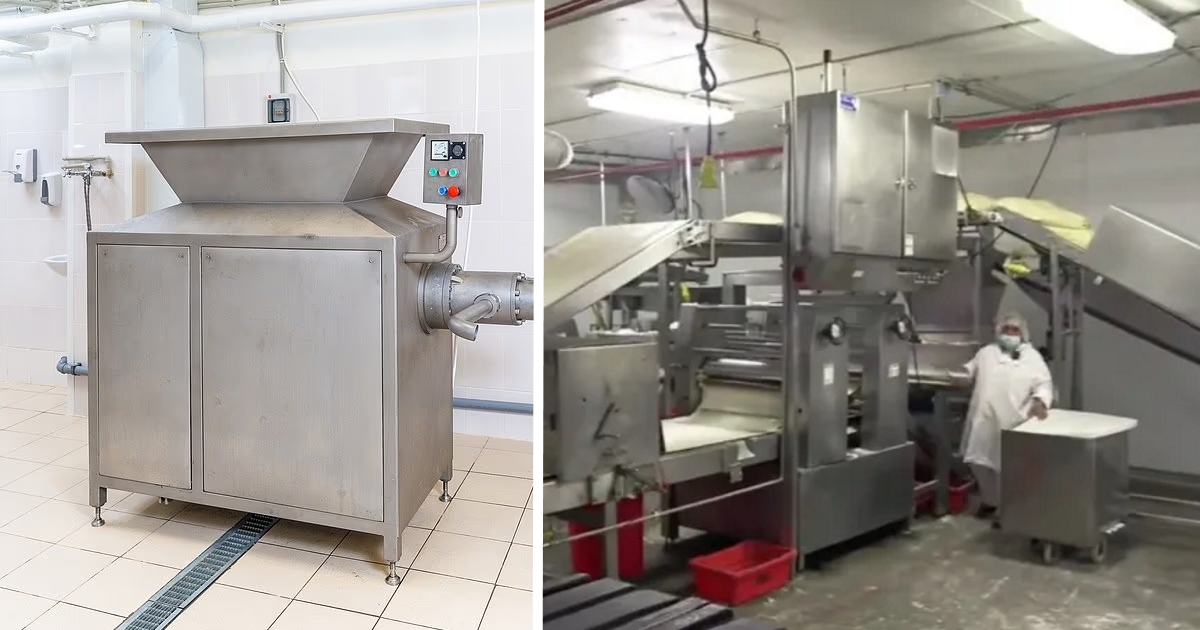It was supposed to be a routine night shift. But at Tina’s Burrito plant in Vernon, California, a 19-year-old sanitation worker was sucked into an industrial meat grinder while cleaning—triggering a horrifying chain reaction of grief, outrage, and soul-searching across the community.
The accident occurred around 9:30 p.m. on July 13, when the teenager was sterilizing equipment in preparation for the next production run. The grinder unexpectedly powered on, pulling him into the machinery. His screams echoed through the plant as coworkers scrambled to cut power—tragically arriving too late. Reports from India Times described the shock and horror.
Despite frantic efforts, staff couldn’t stop the machine in time. Emergency responders found the young worker deceased inside the grinder. Authorities confirmed no foul play, classifying it as a fatal workplace accident. People magazine highlighted how paralysis and disbelief gripped the crew.

Coworkers were too traumatized to speak on camera, but some were seen sobbing outside the plant. Footage captured by The Sun showed hands covering faces and wild-eyed horror.
Calls for accountability surged immediately. Social media lit up—users demanded to know why life-saving locks, sensors, or cut-off switches hadn’t prevented the grinder from activating during cleaning. NDTV covered this question—along with legal experts questioning safety omissions.
A tweet from workplace-safety advocate @FactorySafety365 captured the outrage:
“Cleaning a machine = death sentence? This tragedy shows safety protocols FAILED horribly.”
Another Twitter user lamented the systemic failures:
“No lockout-tagout? No emergency shutoff? 19-year-old gone because of negligence.”
A third post highlighted the global resonance:
“This isn’t just Vernon—it’s every factory cutting corners. When does it end?”
Tina’s Burrito, which supplies frozen burritos to major U.S. retailers like Walmart and Dollar Tree, expressed sorrow. Their official statement said they were “heartbroken,” promised full cooperation with Cal/OSHA and Police, and vowed to “honor his memory.” Guardian-style apologies now read like rinse-and-repeat scripts.
Regulators have launched an in-depth inquiry. Cal/OSHA confirmed it will investigate possible code violations, machine maintenance logs, and training records. Fox News reported authorities are focusing on whether lockout-tagout procedures were properly observed.
Safety advocates argue that cleaning machinery should never occur with any power source intact. Leading mechanization regulatory groups outlined how fatal mistakes persist when insurance trumps integrity. One Reddit thread pointed out that in 2019, a Pittsburgh woman died under eerily similar circumstances.

Experts note the complexity of industrial equipment—kettles, grinders, and conveyer belts can all restart mid-service if protocols lapse. The tragedy shines a harsh light on training, emergency cutoffs, and real-time oversight. ABC7 Los Angeles detailed the machinery and Sanitation Crew setup.
Union representatives called for meaningful change—not Sympathy tweets or plaque speeches. One local organizer stated: “If OSHA violations are found, criminal charges must follow. This was preventable.” They plan to hold a vigil and demand public hearings.
Labor rights groups are making comparisons to previous deadly accidents—including hyperbaric chamber blasts and frozen-oven deaths—emphasizing that a pattern of insufficient oversight has gone unchecked. NY Post recounted past horror stories for comparison.
Families of factory victims are speaking out too. A sibling of a 2015 industrial accident victim said they’re “reliving nightmares.” They urged factory owners and regulators to see each incident as a systemic indictment—not random tragedies.
On TikTok, viral reaction videos of workers sharing safety fails have gone up by 150% since the incident. One trending clip showed a grinder spinning with fresh-off-the-clock boots behind it. Viewers flooded comments with warnings: “That’s your life in balance—and someone didn’t flip the switch.”
Legal analysts warn of litigation. They suggest families should seek wrongful-death suits citing negligent maintenance and inadequate safety training. Insurance claims won’t wipe away life lost, but they might spur regulatory reform.
The accident has had chilling effects on Vernon plant operations—shifts have been delayed, production paused and staff undergoing emotional counseling. Local communities are pitching in, providing grief counseling and holding compassionate zone gatherings.
In Washington, lawmakers are renewing focus on enforcing lockout-tagout and machine safety laws. A bill is under review that would require real-time power monitoring in food manufacturing facilities. Sun coverage of proposed legislation outlines key safety measures.
This tragedy demands more than condolences—it demands accountability and action. Because if cleaning a machine can kill, the cost of shortcuts is measured in blood.







